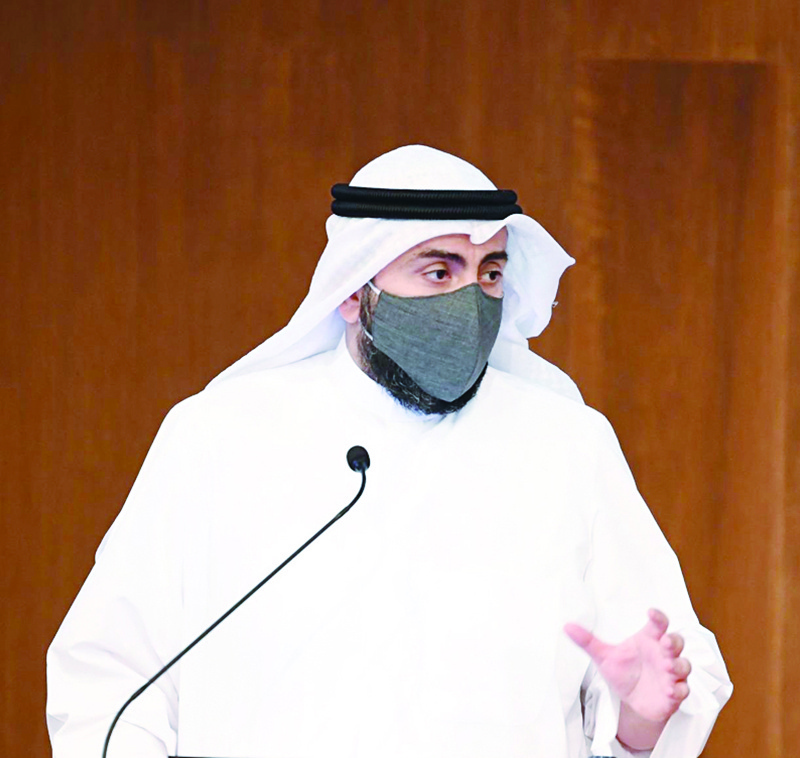
KUWAIT: Health Minister Sheikh Dr Basel Al-Sabah said Thursday failure to adhere to precautionary measures and over-indulgence in family visits during lockdown has led to further spread of coronavirus, warning the situation might “get out of hand.” Based on state figures, the Cabinet decided to maintain the current first phase of the five-phase restart plan with a continuous reassessment of the health situation, until health standards required to move on safely to the second stage are reached, he said. The minister was speaking to reporters in a remote press conference, following a Cabinet meeting chaired by His Highness the Prime Minister Sheikh Sabah Al-Khaled Al-Hamad Al-Sabah, aimed at discussing the health ministry report on the situation.
“Today we are able to control (the pandemic) and we do not want to reach a stage where the pandemic controls us,” he said. Many fathers and mothers were tested positive and admitted to the intensive care unit in spite of staying at home, he said. They caught the virus after hosting gatherings and not adhering to social distancing rules or washing their hands, he added. He urged the public to cooperate with authorities in order to proceed to the next phase, quoting His Highness the Prime Minister, who said that “we are at a crossroads.” The criteria for moving from one stage to the other are the rate of infection transmission, the stability of patients’ numbers for a sufficient period, low levels of family occupancy at ICUs and hospitals and low infection rates.
Meanwhile, the lifting of the isolation of some areas in the country came after a drop in infection rates there, he explained. Despite having recorded “very good” improvements in four criteria, the rate of transmission remained 1.07 (the normal being one), the minister said, adding this necessitated the continuation of this phase, which will be reassessed over the coming days. He went on to urge the importance of wearing masks, social distancing and washing hands, leaving home only for extreme necessity.
Eased restrictions
Asked about the application of dexamethasone in Kuwait after its success in limiting coronavirus-related deaths in the UK, he said the drug was available and abundant throughout Kuwaiti hospitals; however, the amount and timing of administering the drug has not yet been determined. He commended the study, saying it has “very good” results amongst coronavirus patients, suffering from acute respiratory problems.
The Kuwaiti government decided Thursday to ease restrictions imposed due to curb spread of coronavirus as of today but would not allow public sector’s workers to return to their offices this week. The government decided to extend the first phase of a plan to restore normal life because of the high number of infections among the Kuwaiti citizens, government spokesman Tareq Al-Mezrem told the online news conference. He said the Ministry of Health would be assessing the health situation of the virus and would refer the assessment to the Cabinet this week. He added the Cabinet assigned the ministers to provide services for the public as of today.
Mezrem said the government also decided to change curfew hours to start at 7:00 pm until 5:00 am starting today morning. He said the government decided to lift a lockdown on areas of Hawally, Nuqra, Maidan Hawally and some blocks in Khaitan as of today. The government, said Mezrem, also allowed limited air travel for citizens with critical health conditions who should travel at their own expense. Students who must travel to attend their tests will be allowed to do so, he said, as well as citizens who have foreign wife or husband abroad and the trip should be for 30 days minimum.
Any person who wants to travel should submit a request for the Ministry of Interior 10 days before the trip, he said, and citizens should pay for their treatment in case of contraction of the virus. The government compels passengers wishing to come to Kuwait to provide a copy of a certificate in Arabic that they conducted a PCR test four days before the trip, providing they are clean of the virus, said Mezrem. —KUNA










